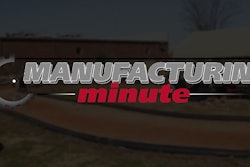A woman picks up her smartphone, opens an app and taps in a custom order for a new car. Her simple action sets a complex supply chain and production processes in motion. These actions will culminate when her car moves through a production line with every option and feature she selected, to ultimately be delivered to her driveway — just a day after she placed her order.
Could this really happen? Is this science fiction? The distant future? Deloitte thinks it’s already here for some industries. The firm recently reported that “Digital technologies, especially the Internet, have made personalization and customization available to a wide range of consumers, making it more cost-effective to satisfy demand. As a result, tailored products for niche markets are becoming increasingly available and accessible.”
Deloitte goes on to say that this is fueling ever-increasing expectations on the part of consumers, putting pressure on all manufacturers to provide exactly what the customer wants.
It’s tempting to think this kind of mass customization will be limited to simple manufacturing challenges: perhaps color choices in clothing or a few plug-in options. It’s especially tempting to believe that mass customization is an issue for other industries, “but not mine.”
But it’s becoming increasingly clear that even the most complex industries are moving in this direction. A video by Peugeot lays out exactly the scenario described above, envisioning a near-future of on-demand, order-of-one manufacturing that will go straight from the customer app to the plant floor.
In many industries, we can imagine products actually custom-designed on a mass scale, digitally tested, and manufactured the same day by 3D printing on the other side of the world. Perhaps the product will be picked up and delivered by drone!
Customers have taken charge of the buyer-seller relationship with their digital technology, and they aren’t going to let go. In the age of experience, everything will be customized.
How Will We Get There?
What we’re really talking about with mass customization is a highly digitized production environment, and the good news is that manufacturers have been evolving this capability for decades now.
Over the years, we’ve moved from isolated CAD design and NPC machining to a world where 3D models are converted to manufacturing processes. Where ERP and planning systems optimize materials and costs, where logistics and supply chains are managed digitally, and where enterprise manufacturing operations platforms provide a common base for deploying and monitoring production processes on a global scale. On the customer-facing side, marketing, sales, websites and apps are creating more customer information and interactions than many companies have figured out how to use.
Meanwhile, lean manufacturers are laying the foundation for mass customization by learning to track and synchronize supply chains and manufacturing operations with great agility. Many industries have adopted just-in-time manufacturing techniques to reduce inventory costs and waste. These capabilities will be essential enablers of mass customization.
Viewed this way, mass customization is inevitable, a natural evolution of digital manufacturing that has been going on for years and has finally reached critical mass with the Internet.
Converging with this trend is the much-talked-about Industrial Internet of Things (IIoT). Computerized tracking of objects has been going on for years, in the form of barcodes, magnetic strips, and simple chips. Now, as everything becomes more intelligent and able to communicate over the Internet, the simple tracking of materials will no longer suffice. Automated responses will be necessary to further automate processes and consolidate response times. IIoT can make this happen. It will help enable mass customization by informing manufacturers of the precise status of every item in the supply and production chain at all times.
What’s Next?
Although digital technology is widely used throughout manufacturing, the systems are still not seamlessly integrated. But this has been the history of computing — individual companies and technologies leap ahead in given areas, and only later do we figure out how to put them together. For example, broadcast TV, the Internet and phones were once entirely separate domains. Now they’re linked in a seamless world of communications and information access.
Some manufacturers are not waiting for evolution to take its course but are instead building their digital factories now. Peugeot takes it seriously — they’re actually working toward the order-of-one world presented in the video above.
And if automobiles aren’t complex enough, how about rocket science? Lockheed Martin’s Space Systems Division has launched Digital Tapestry, an initiative that will create integrated, end-to-end digital operations “from concept, design, simulation, manufacturing and assembly, to testing and getting the final product to the customer."
Another enabler of mass customization will be additive manufacturing, a technology that is quickly becoming mainstream. Pratt & Whitney, GE and other companies are already producing engines containing 3D printed parts that are certified for commercial use. It’s safe to say that if it’s good enough for aerospace, it’s probably good enough for any industry.
Those manufacturers that make the investment today into merging the two worlds of virtual or digital manufacturing with that of “actual” production will be in a position of competitive advantage — one that will help them to better address the needs of their customers — and their customer’s customers. Companies such as Dassault Systèmes have created solutions such as these that are now starting to be deployed.
Conclusion
Few manufacturers are ready to make the kind of commitment that Peugeot and Lockheed Martin have made, but that doesn’t mean they can’t begin preparing for this new world today.
Short of launching a full-scale corporate initiative, manufacturers can take meaningful steps towards building the foundation for mass customization. Key components of digitally controlled mass customization have value in their own right and can be deployed now. Technologies in this category include 3D CAD modeling, global manufacturing operations management platforms, supply chain synchronization and end-user apps that capture important customer demand data. The more integrated they are at each step, the better.
These investments provide payoffs in the near-term, and they will be essential for manufacturers who expect to adapt in an age of experience where the customer runs the manufacturing floor.
If you’re still tempted to think of mass customization as something in the distant future, remember — it was only 15 years ago that people were wondering if the Internet was really going to become commercially important. And we all know how that turned out.
Eric Green is Vice President of Dassault Systèmes.






















